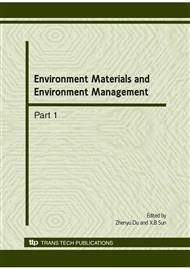[1]
B.A. Babcock, P. G Lakshminarayan,. J.J. Wu, and D. Zillberman: The economics of a public fund for environmental amenities: a study of CRP Contracts, American Journal of Agricultural Economics, Vol. 78(1996), pp.961-971.
DOI: 10.2307/1243852
Google Scholar
[2]
R. Claassen, A. Cattaneo, R. Johansson: Cost-Effective Design of Agri-Environmental Payment Programs: U.S. Experience in Theory and Practice, Paper to be presented at ZEF-CIFOR workshop on payments for environmental services in developed and developing countries Titisee, Germany, June 16-18, 2005, http: /www. cifor. cgiar. org/pes/publications/pdf_files/US_paper. pdf.
DOI: 10.1016/j.ecolecon.2007.07.032
Google Scholar
[3]
R Coase: The Firm, The Market, and The Law, the University of Chicago Press, Chicago and London(1988).
Google Scholar
[4]
L. Crase, L. Reilly, and B. Dollery: Water markets as a Vehicle for Water Reform: the Case of New South Wales, the Australian Journal of Agricultural and Resource Economics(2000), 44: 2, pp.299-321.
DOI: 10.1111/1467-8489.00113
Google Scholar
[5]
A. Dinar, M. Rosegrant, and R Meinzen-Dick:. Water Allocation Mechanisms-Principles and Examples, World Bank, Agriculture and Natural Resources Department. http: /www-esd. woprldbank. org/(2001).
DOI: 10.1596/1813-9450-1779
Google Scholar
[6]
X. SH. Diao, T. Roe:Can a Water Market Avert Double-whammy' of Trade reform and Lead to 'Win-win' Outcome, ,Journal of Environmental Economics and Management 45(2003), 708-723.
DOI: 10.1016/s0095-0696(02)00019-0
Google Scholar
[7]
G. Hardin:. The Tragedy of The Commons. Science, 162(1968) 1243-1248.
Google Scholar
[8]
W. Kasper: Property Rights and Competition: an Essay on the Constitution of Capitalism, the Center for Independent Studies Limited, NSW(1998).
Google Scholar
[9]
E. Ostrom: Governing the Commons: the Evolution of Institutions for Collective Action, Cambridge University Press(1991), Cambridge.
DOI: 10.1177/03058298910200030712
Google Scholar
[10]
J. Rolf, and J. Windle: Valuing options for reserve water in the Fitzroy Basin, The Australian Journal of Agricultural and Resource Economics, Vol. 49(2005), pp.91-114.
DOI: 10.1111/j.1467-8489.2005.00265.x
Google Scholar
[11]
M. Ribaudo, J. Agapoff: Cost to Swine Operations from Meeting Federal Manure Application Standards: The Importance of Willingness to Accept Manure, To be presented at the SERA-IEG 30: Natural Resource Economics Meetings(2003).
Google Scholar
[12]
J. J Wu, and K. Skelton-Groth: Targeting conservation efforts in the presence of threshold effects and ecosystem linkages, Ecological Economics 42 (2002) 313-331.
DOI: 10.1016/s0921-8009(02)00104-0
Google Scholar


